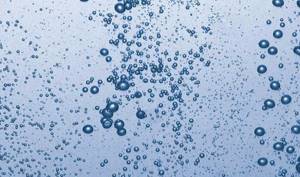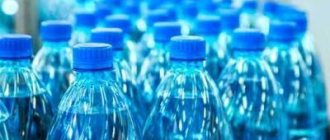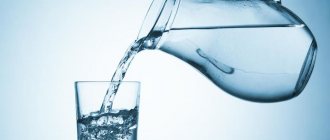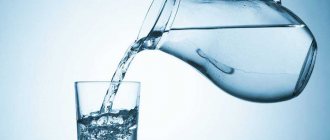Alcohol-free soft drinks have long gained popularity around the world. In this regard, special mention should be made of sparkling water, without which many people can no longer imagine their lives. It is loved in many countries, but the undoubted record holder for the consumption and production of such a product is the United States, but a lot of people drink it in our country as well. Many people still cannot understand exactly whether carbonated water is harmful or beneficial? This issue should be examined in more detail.
About properties
Carbonated water is simply water to which carbon dioxide (CO2), more commonly known as carbon dioxide, has been added. Currently, it is produced on a large scale and is available to a huge number of people, although previously it was considered an elite drink for the privileged segments of the population.
The history of sparkling water dates back to ancient times. For example, the famous ancient Greek healer and philosopher, Hippocrates, wrote several chapters of his own medical treatises on the topic of the miraculous healing properties of water from natural mineral springs. Already in those days, people wondered why sparkling water was so useful, and they conducted small studies, trying to find the answer.
To date, it has been possible to establish for certain that the beneficial properties of carbonated water for the body are manifested both when consumed internally and when used externally.
Basic properties:
- It allows you to quickly quench your thirst and copes with this task better than ordinary still water.
- Activates the production of gastric juice. That is why mineral water with gas is recommended for people who have problems with the gastrointestinal tract and suffer from low levels of acidity in the stomach.
- The carbon dioxide contained in it can prevent the proliferation of bacteria.
- It is characterized by a high level of mineralization, contains neutral molecules, and is responsible for enriching it with vitamins and microelements necessary for normal life.
Mineralized water with gas has a number of medicinal properties and can improve your general condition. However, if used incorrectly, it can cause side effects and negatively affect health.
Types of drink
I suggest first understanding the terminology. Drinking water can be divided into:
- fresh water, which we often call “plain water”;
- mineral;
- carbonated.
Fresh
Plain drinking water also contains beneficial substances and salts, such as calcium, magnesium, potassium, sulfates and chlorides. But their quantity, which is determined by the level of mineralization, is low.
Thus, fresh water has a mineralization rate of no more than 0.5 grams per liter. And for mineral - from 1 to 3 grams per liter.
Mineral
Mineral water is taken from natural sources and contains beneficial minerals and other elements. Depending on exactly what substances and in what quantities it contains, it is divided into:
- medicinal;
- dining room;
- medical dining room.
Carbonated
Mineral carbonated water is beneficial for our body due to the fact that it contains various mineral compounds and trace elements.
In nature, water becomes carbonated due to the presence of carbon dioxide in it. Such a liquid is much less common than ordinary liquid without gas. In addition, this characteristic is not constant; over time, the gas evaporates, and thus all useful properties are lost.
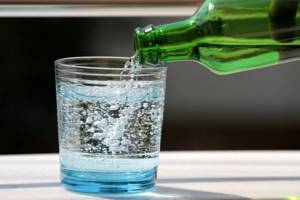
In the 19th century, a device was invented that artificially saturated water with carbon dioxide using baking soda - then it was called soda. This gas is still found in soda today.
Currently, carbonated water is produced both by using high pressure in siphons and saturators, and by using the same baking soda.
In the production of drinks such as beer, champagne, kvass, natural fermentation is used to obtain a carbonated effect, as a result of which the same carbon dioxide is formed.
It is necessary to distinguish between sparkling water of low and medium mineralization, which can be drunk daily if desired, and water with a high degree of mineralization - it is most often used to treat diseases and only on the recommendation of a doctor.
Sweet carbonated water is the so-called “lemonade”, made with the addition of syrups, dyes and sugar.
Dietary properties
Numerous studies conducted in recent years have proven that carbonated water also has benefits for weight loss. Having a number of dietary indicators, it affects the functioning of the digestive system. In particular, it promotes:
- Improving the swallowing process by stimulating certain nerve endings responsible for this function. It is noteworthy that the colder the drink, the more pronounced this effect becomes.
- Maintaining a feeling of fullness over a longer period of time. It slows down the digestion of food, reducing appetite. However, the mentioned property also has a downside: stagnation of food in the stomach can provoke a number of negative phenomena.
- Removing waste and toxins, eliminating constipation. One two-week experiment conducted among elderly people showed that drinking carbonated mineral water has a beneficial effect on intestinal function. In particular, 58% of participants suffering from regular constipation managed to normalize bowel movements and get rid of a delicate problem.
The discovery of the dietary properties of carbonated water influenced the popularization of the drink among those who are actively struggling with excess weight.
How to store sparkling mineral water
Hermetically sealed mineral water can be stored until the specified expiration date, usually 1-2 years. Bottles are kept in a dark and cool place, without exposing the liquid to freezing.
On a note. Water in glass containers retains its properties longer.
After opening the bottle, the mineral water retains its quality for 2 days at room temperature. Afterwards, sediment may form and the taste may change. In the refrigerator, the drink in a closed container can be stored for up to 5 days.
Reasonable consumption of natural mineral fluid has a beneficial effect on the functioning of the body. An unlimited amount of drink supplied with gases is harmful.
Carbonated water for weight loss
Carbonated water does not differ in its chemical composition from ordinary water, with the exception of one nuance - the content of carbon dioxide. This substance is synthesized by the body independently and ensures its normal functioning.
Carbon dioxide is responsible for:
- regulation of enzyme production;
- normalization of metabolic processes;
- proper absorption of microelements.
It also increases blood pressure and affects the functioning of the respiratory system through its action through the carotid tubules.
Once inside, gas-containing water begins to affect the walls of the stomach. Carbon dioxide gradually accumulates, which evaporates naturally, causing belching or fermentation in the intestines. The size and volume of the stomach depends on the amount of carbonated water consumed. Regular use leads to its increase, stretching and, as a result, increased appetite. Thus, a person drinking soda needs more food to fill up and satisfy the feeling of hunger.
Also, carbonated drinks speed up the digestion of food. If under normal conditions this process lasts 4-5 hours, then after consumption it is reduced to 20 minutes, after which the person begins to feel hungry again. As for microelements coming from food, they are not absorbed.
Some people are confident that they can get rid of those hated pounds by starting to drink sparkling water on an empty stomach in the morning. Unfortunately, such a habit not only does not stimulate weight loss, but also leads to negative consequences, for example, the formation of ulcers in the stomach.
How to carbonate water at home
It is not difficult to make a carbonated drink from plain drinking or mineral water at home. There are several cooking options.
- To saturate the water with carbon dioxide, you will need to add regular baking soda and citric acid to it. For 1 liter of liquid you will need 2.5 teaspoons of baking soda and 5 tablespoons of citric acid (can be replaced with juice from half a lemon). The powders are thoroughly mixed together and filled with water.
After mixing, the drink can be drunk.
- If you purchase a carbonating siphon in a store, the process of saturating the water with carbon dioxide will take a matter of seconds. The siphon container is filled with liquid that requires carbonation without filling it to the top. A gas canister is attached to a special holder. Gas fills the free space in the jug. By pressing the button on the siphon, the liquid under pressure comes out, enriched with carbon dioxide.
In this way you can get not only carbonated mineral water, but also sweet soda. It is enough to add sugar to taste or fruit syrup to the liquid.
Soda and calcium deficiency
There is a popular belief that carbonated drinks are harmful to bone health and lead to a lack of calcium due to their high level of acidity. The fallacy of such conclusions has been scientifically proven. A number of laboratory studies have confirmed that carbonization has nothing to do with bone tissue and cannot affect their condition.
One research project involving over a thousand people found that decreased bone density occurred only when drinking sugar-sweetened sodas.
Mineral carbonated water is not therapeutic for people suffering from calcium deficiency, but at the same time it does not cause bone destruction. People who have encountered this unpleasant illness are advised to consume more skeleton-strengthening foods: cottage cheese, milk, kefir, etc.
Use during pregnancy
Can pregnant women drink sparkling water? In medical circles, it is customary to talk about the possible harm of this drink for expectant mothers. The fact is that the high content of carbon dioxide interferes with the normal functioning of the intestines and disrupts peristalsis. The result is flatulence, bloating and problems with stool: from diarrhea to constipation.
Thus, despite a number of healing properties, drinking carbonated water during pregnancy is not recommended. It can provoke a number of negative phenomena, which will not be so easy to eliminate.
How is it useful and harmful?
Carbon dioxide speeds up the digestion process. At the same time, beneficial nutrients from food do not have time to be absorbed and, as a result, the process of rotting begins in the intestines.
When drinking soda, there is an increase in the production of hydrochloric acid, which corrodes the walls and mucous membranes of the gastrointestinal tract, provoking the development of ulcers and gastritis. Long-term and large consumption of soda can cause the following phenomena:
- Belching.
- Bloating.
- Flatulence.
Sweet pops contain sugar or sweeteners, acids (citric, malic, orthophosphoric). Regular consumption of soda leads to the following adverse effects:
- Overweight and obesity.
- Renal colic.
- Destruction of tooth enamel.
- Liver diseases.
- Hypoglycemia.
- Alzheimer's diseases.
- Disturbances in the normal process of bone formation in children.
Displacement of water, milk and juices from the diet due to increased consumption of sweet carbonated drinks leads to a deficiency of nutrients, vitamins and minerals in the child’s body. Consumption of fructose contained in sweet soda leads to dehydration.
Indulging in sugary carbonated drinks increases the risk of pancreatic, esophageal, and breast cancer. For women, greater consumption of synthetic soda is fraught with cardiovascular diseases and increases the risk of premature birth.
Caffeine promotes the removal of calcium from bones, contributing to the development of osteoporosis. The most harmful ingredient, aspartame, used as a sugar substitute, is a thirst maker. Phenalalanine, which is part of the substitute, accumulates on the cerebral cortex and, with prolonged consumption of sweet soda, leads to mental disorders, increased nervousness, and depression.
Regular consumption of sparkling mineral water improves and maintains overall health. It is important to use it correctly, taking into account the characteristics of your own body.
Positive characteristics:

Absence of pathogenic microbes due to carbon dioxide content.- Normalization of acid-base balance.
- Beneficial effects on the gastrointestinal tract.
- Strengthening bones and teeth.
- Replenishment of microelements reserves.
- Significant improvement in the state of the cardiovascular system.
- Reducing cholesterol levels.
- Better thirst quencher than regular water.
- A beneficial effect on blood composition, which generally improves nutrition at the cellular level.

Despite the beneficial properties, it is important to follow safety measures and rational amounts. If you consume carbonated mineral water uncontrollably, you may encounter negative factors:
- Deterioration of bone structure.
- Bloating and intestinal colic.
- Relapse of gastrointestinal tract diseases.
- The appearance of kidney stones.
- Heartburn.
The product can bring both benefits and harmful properties. It depends on the initial state of the body. The frequency and amount of water consumption is taken into account.
To achieve the best effect, it is better to consult a doctor and take a detailed blood test.
For men
It is important for men to keep their body in good shape using simple methods. Carbonated mineral water allows you to replenish microelements, maintain normal body condition and emotional state.
Positive properties of mineral water for men:
- getting rid of fatigue;
- increased muscle tone;
- normalization of the gastrointestinal tract;
- activation of brain activity.
When drinking mineral water, your overall health improves. This is especially important during regular physical activity or prolonged stressful situations in the workplace.
As for the negative effects, mineral water can worsen the condition of the cardiovascular system with long-term use. It is not recommended to drink it while working out in the gym due to the excess salt content.
For women
In general, mineral water has a positive effect on the body. When symptoms of depression appear, it significantly improves the condition. Your health and mood improve.
Mineral water provides the following benefits for women:
- removal of excess moisture;
- beneficial effects on the nervous system;
- improving the condition of hair, skin and nails;
- weight loss;
- normalization of metabolism;
- positive effect on metabolism and digestive system.

To achieve the best effect, it is important to focus on the composition of microelements. Thus, boron promotes the production of estrogen. This is especially important for women with hormonal imbalances after the age of 40.
A good solution is to take a course of drinking mineral water when planning a pregnancy. This helps maintain your own health and the proper formation of the fetus.
Among the negative factors are:
- the appearance of insomnia;
- feeling depressed and lethargic;
- problems with the condition of the urinary and gallbladder.
Mineral water is safe if it contains salts in an amount of 1 gram per liter of water. Medicinal formulations with large amounts of salt require prior consultation.
During pregnancy
During pregnancy, a woman needs an increased set of microelements and nutrients. Often they cannot be replenished from food.
Useful substances are used to build the child’s body. At the same time, the expectant mother experiences a deficiency in vitamins. Dry skin appears, hair and nails become brittle.
Mineral water has a number of advantages:
- Improving the functioning of the digestive and respiratory systems.
- Supplying the body with useful minerals and salts.
- Increased enzyme production.

Artificially carbonated mineral water, which increases gas formation, is excluded. When choosing quality water, it is advisable to limit its consumption to 1-2 glasses per day.
Among the negative factors of mineral water with gas during pregnancy are:
- The appearance of heartburn.
- The formation of flatulence and additional stress on the gastrointestinal tract.
- General swelling.
The best choice for pregnant women is mineral water with a minimum amount of salts. Microelements are replenished, the general condition of the woman improves.
This is especially important during the first trimester, which is characterized by symptoms of toxicosis and fatigue.
When breastfeeding, a young mother experiences a deficiency in microelements and minerals. They are found in large quantities in carbonated drinks. Most of the nutrients are spent on lactation.
Useful qualities of mineral water for the expectant mother:

calcium and iron provide all the child’s needs;- lack of calories does not affect weight;
- hormonal levels are normalized;
- digestion improves;
- the condition of the nervous, musculoskeletal and cardiovascular systems improves;
- sodium regulates metabolic processes, normalizes water and electrolyte balance;
- Potassium helps maintain blood pressure at normal levels.
At the same time, there are also negative aspects. If you have kidney problems, drinking mineral water is not recommended. Drinking water too often can lead to fluid retention and swelling.
It is important for a young mother to consult a doctor before purchasing mineral water. Not all diseases manifest themselves in the initial stages. The treating specialist will identify the lack of important components and recommend a carbonated mineral water with the best composition.
Is it possible for children?
A child's body needs constant fluid replenishment. For this reason, children drink water often and in large quantities. The question arises whether it is possible to replace ordinary water with carbonated mineral water.
Doctors recommend mineral water for children only after reaching 3 years of age. Moreover, it is used for medicinal purposes.
It is not allowed to give it to a child to quench thirst. Mineral water is contraindicated for children under 3 years of age. This is due to the increased salt content, which can negatively affect the condition of the kidneys.
After 3 years, mineral water can be introduced little by little after consultation with a pediatrician. It is necessary for the treatment or prevention of disorders in the body.
- disorders of the kidneys, urinary system, gastrointestinal tract;
- carbonation negatively affects the condition of the children's stomach.
The doctor will determine the norm for the child. The amount of mineral water you drink depends on the problem and the required amount of microelements. A preliminary examination is carried out to obtain a complete picture.
Choosing healthy sparkling water
As noted earlier, natural mineral water enriched with carbon dioxide has a number of positive qualities and is characterized by a healing effect. However, in order for it to have a beneficial effect, you need to be able to choose it correctly.
Step-by-step instructions on how to choose water:
- It must be of natural origin - from mineral springs.
- Choose only those bottles that are labeled “drinking” or “table”.
- Make sure that no sediment forms at the bottom of the bottle.
Additionally, the healthfulness of sparkling water largely depends on its storage. It should always be in the refrigerator, since this is the only way to prevent the proliferation of microbial and bacterial microorganisms, and the lid should be tightly closed.
Chemical composition of sparkling mineral water
The difference between mineral water and ordinary liquid is the presence of a large amount of salts and minerals, namely: magnesium, sodium, potassium, chlorine, boron, calcium, iodine, zinc and other substances. The chemical composition of different sources of mineral water is not the same. It depends on the type of soil in the area from which the liquid is extracted.
Reference. Mineral water is rainwater that passed through the earth thousands of years ago. It dissolved in itself various substances that made up the layers of the surrounding soil. The process of their interaction often took place at high temperatures and in the absence of oxygen. The deeper the reserves of mineral moisture lie, the more saturated they are with salts and active substances.
Based on their mineral composition, liquids are divided into several groups:
- hydrocarbonate (the most extensive group);
- chloride;
- sulfate.
Mineral waters necessarily contain sodium, calcium and magnesium. Depending on the type of predominant element, water is called “magnesium”, “calcium” or “sodium”. There are liquids with an increased presence of boron (Elbrus), iodine (Lysogorskaya, Arkhyz). Accordingly, the effects on the body of these drinks will vary.
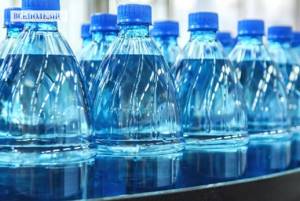
There are liquids of complex composition: hydrocarbonate-sulfate, hydrocarbonate-chloride-sulfate. The mineral water also contains various gases: carbon dioxide, hydrogen sulfide, nitrogen.
Important! Some types of mineral water contain arsenic and radioactive substances. They are poisonous and not suitable for drinking. Some, especially saturated liquids, are used only for bathing.
The concentration of salts and minerals in the liquid varies. The more there are in 1 cubic decimeter, the higher the degree of mineralization and the stronger the effect of the drink on the body. In drinking liquid it can reach up to 36 g. Drinking natural mineral water is divided into types according to the degree of mineralization:
- table (the lowest degree of mineralization - up to 4 g), the drink can be consumed daily, contraindications are minimal;
- table-medicinal (mineralization up to 10 g per cubic decimeter), which is drunk in courses to strengthen the body;
- medicinal (with a high content of active substances), the liquid is taken strictly as prescribed by the doctor.
Important! Only natural mineral water extracted from the ground has beneficial properties. A drink artificially enriched with salts should not be considered as medicinal.
Negative effects on the body
It is worth mentioning the harmful effects of carbonated water on the body. It can cause ailments such as flatulence, bloating, belching or heartburn. All these unpleasant phenomena occur due to the accumulation of carbon dioxide and its effect on the gastric walls.
As a rule, sparkling mineral water does not have a strong negative impact on health; rather, it causes a number of uncomfortable sensations and inconveniences. However, it can cause serious harm to people suffering from stomach problems.
The following are the main contraindications for use:
- gastrointestinal disorders;
- acute forms of ulcer;
- chronic gastritis.
Also, drinking carbonated water is not recommended for pregnant women and people prone to increased gas formation.
If carbonated mineral water, despite all its shortcomings, has a number of positive properties and can improve health, then the same cannot be said about sugar-containing cocktails with gas. Next, we will tell you in detail about the dangers of sweet soda.
Features of use
Therapeutic mineral water is prescribed by the attending physician, who recommends the quantity and frequency of its use. It is recommended to take the table medicinal drink according to the following scheme:
- 20-30 minutes before meals, in small sips, to enhance the secretion of gastric juice;
- 60-90 minutes before meals, in one gulp, with increased acidity and constipation;
- 30 minutes after eating, for stomach ulcers.
A single dose of medicinal drink is 100-200 ml, daily intake is from 600 to 1000 ml. Healing water is drunk in smaller doses - 30-100 ml.
To treat constipation and stimulate the functioning of the stomach and intestines, the drink is taken cool (temperature from +12 to +20 degrees). In other cases, the liquid is heated to a comfortable +28 +38 degrees. A warm drink relieves stomach and intestinal cramps and soothes pain.
Attention! Before drinking the drink, it is recommended to rid it of gases.
Women (pregnancy and breastfeeding)
Limited consumption of non-carbonated table and medicinal table mineral water will benefit the body of a pregnant woman. The mineral water will help alleviate toxicosis (relieve nausea) and strengthen the immune system during the cold season (it is recommended to gargle and rinse the nose with the liquid). It perfectly quenches thirst and saturates the body with useful substances.
During pregnancy, you can drink 2-2.5 glasses of mineral water per day for 15-20 days.
Important! In addition to standard contraindications to drinking the drink, pregnant women are prone to swelling. In this case, fluid intake (including mineral water) is reduced.
A nursing woman is allowed to drink up to 3 glasses of alkaline and magnesium mineral water without gas per day. These drinks soothe and improve bowel function (constipation is a problem for many women in labor).
Important! Sulfate water should not be drunk during pregnancy and lactation. The drink prevents the body from absorbing calcium from food.
For men
Mineral water has many benefits for men's health:
- relieves fatigue and tones;
- normalizes low blood pressure;
- strengthens the walls of blood vessels;
- normalizes metabolism.
After active sports, when the body loses minerals and salts through sweat, the use of mineral water is recommended. It should not be drunk cold (optimally +15 +18 degrees), in small sips.
Attention! You should drink no more than 300 ml of liquid at one time.
Why is sweet soda harmful?
Modern children consume much more sugar than their peers just 40 years ago. They drink much less milk and dairy products, without receiving the normal dose of calcium. All this cannot but affect the condition of their teeth and bones, resulting in various ailments and serious diseases. At the same time, children (as well as adults) get a record share of sugar from non-alcoholic, sugar-containing carbonated drinks - lemonades. You should be as careful as possible with their use, and it is better to completely exclude them from the diet.
Below are a number of facts explaining why carbonated water with sugar is harmful:
- It contains a huge amount of chemical additives that negatively affect the digestive system and overall health.
- It leads to calcium deficiency and bone tissue damage. Due to this, diseases such as osteoporosis and kidney stones develop.
- It corrodes tooth enamel, provokes the development of caries, and tooth decay.
In addition, sweet soda affects the stomach, making it more voluminous and distended. It forces a person to consume more food than he actually needs. All this leads to weight gain, obesity and, as a consequence, problems with the heart, thyroid gland, and reproductive functions.
Nutritionists strongly advise reducing the amount of sweet soda you consume, and ideally, giving it up altogether. Many manufacturers try to mislead buyers by saying that their product is low-calorie and does not contain sugar. It is not recommended to believe such statements. The drink may not contain sugar, but it will certainly contain some kind of sweet substitute, which is also not healthy. Therefore, if you want to lose weight, exclude such foods from your diet.
How to use carbonated water correctly for the greatest benefit
Mineral sparkling water cannot be drunk like regular water. To lose weight, you must use exclusively naturally carbonated mineral water, such as Borjomi or Essentuki . Water consumption is carried out according to the following scheme:
- In the morning before meals to thin the gastric juice and cleanse the intestines.
- Half an hour before each meal to reduce appetite.
The duration of the mineral water diet is one week. In this case, it is necessary to exclude flour and sweet foods, alcoholic beverages, salty foods, semi-finished products and fast food from the diet.
The maximum consumption of sparkling mineral water with a mineralization level of up to 4 mg is half a liter per day . This amount is also recommended for carbonated drinking water. For gastrointestinal diseases, such as gastritis or stomach ulcers, drinking carbonated water is not recommended.
To get rid of gas bubbles, just leave the bottle open for two hours or break the bubbles by stirring the liquid. It is recommended to drink sweet soda through a straw and without preservatives or harmful sweeteners.
